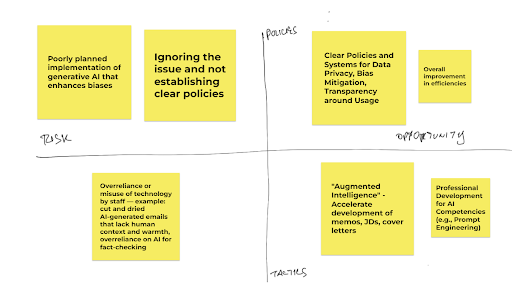Revolutionary or Dystopian: Using technology to build people-centered companies
If you have somehow missed that we are rapidly moving to a world of generative AI — artificial intelligence that can generate text, images and other media based on human prompts — impacting how we work and live, you may be in one of the few positions that might not be affected by this evolving technology.
But for everyone else, ChatGPT and other LLMs — large language models — like Google’s Bard, will have a significant potential influence on our organizations, and particularly in talent and culture work. It’s early days, and too early to identify the exact impact and function of these tools, but what’s clear is that every organization needs to begin exploring and understanding these technologies.
(Full disclosure, the outline for this blog came from ChatGPT. It seemed appropriate.)
First, let’s start with how this technology may revolutionize, for the better, how we run people operations in companies.
Automating repetitive tasks, such as developing a first pass on memos, job descriptions, interview questions, and team survey questions.
Providing personalized development and support to employees by analyzing performance reviews and resumes and suggesting areas for growth and improvement.
Providing the data analytics to make decisions around team satisfaction, turnover rates and overall performance.
But not so fast, there are some important challenges to think through. For years, AI researchers and technology critics have identified a number of known challenges and concerns with regards to AI. None of this goes away, and in fact, as AI is implemented more broadly across society, the numerous risks continue to be a concern. Some examples include:
Where is all this data going? Privacy is a critical question, and we are still early days in norms, standards and regulations around data privacy.
How biased are the results? Early studies are already showing significant biases across race and gender lines. The ChatGPT outline suggested that using ChatGPT for reviewing resumes and doing first round screens would be a benefit. But would it be?
How empathic can AI really be? You are talking to a robot, and when you are talking about creating human centered spaces, that lack of emotional intelligence may be limiting.
If we are to take the cautiously optimistic stance, there may be ways to mitigate the challenges. To think about this, let's look at a simple 2x2, with two axes: Risk and Opportunity on one line and Policies and Tactics on the other.
Policy Opportunity—Policy Risk
The risk right now is twofold. On the one hand, by ignoring the issue and not establishing clear policies, organizations run the risk of getting behind the curve on what is likely to be a highly influential technology. On the other hand, poorly thought-through policies can hamper an organization’s implementation while amplifying biases.
The opportunity right now is to establish clear policies and procedures. This can include implementing generative AI tools that include policies for data and privacy, testing and mitigating against biases, and developing transparency around usage. Most importantly, even in its early days, policies can outline an organization’s general stance on artificial intelligence and its usage, even while recognizing that the technology is evolving.
Tactical Opportunity—Tactical Risk
The risk with AI, especially in this early stage of its evolution, would be an overreliance or misuse of the technology, leaving good human decisionmaking out of the loop. This could range from the emotional (overly dry, AI-generated emails) to the catastrophic (utilizing biased results for decisions). On the other hand, the opportunity can take the form of augmented intelligence, namely, using AI to develop a first pass on things like job descriptions, memos, and outlines to help you draft these things faster.
The rapid evolution of this technology puts real pressure on us to get ahead of it and create the policies and guardrails we will need to harness its power without doubling down on the bias that runs rampant online. Great organizations need to be making their plans now. And great talent leaders are seeing the opportunities and challenges. If you aren’t thinking about ChatGPT yet and its potential to strengthen or destroy your culture, it might be time to talk to some real people at coLeague.

